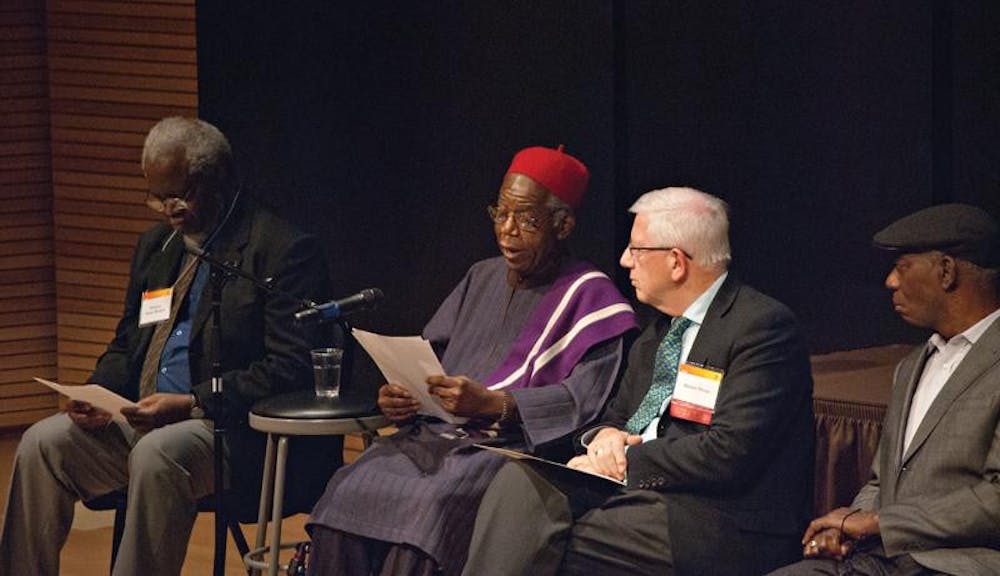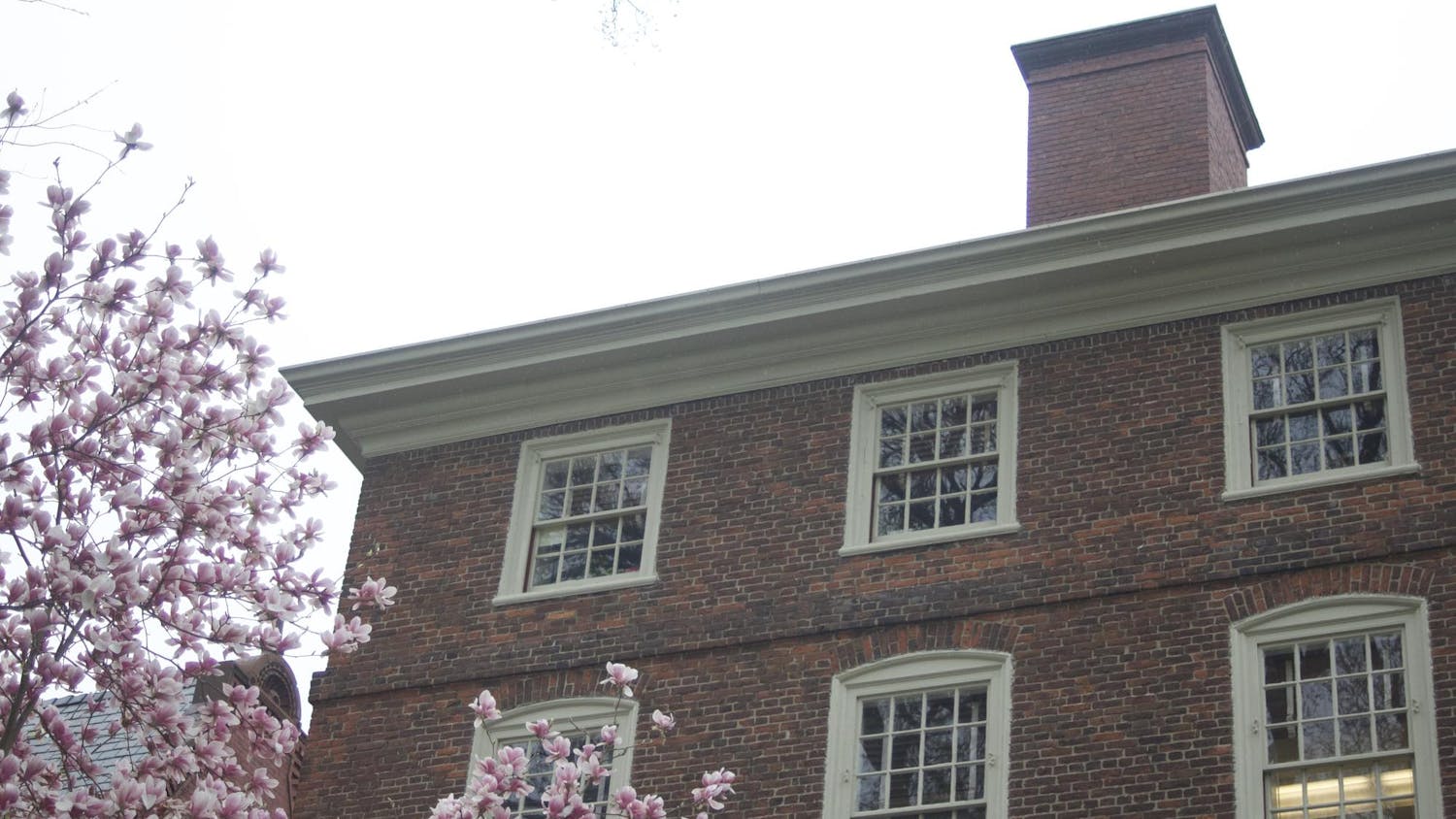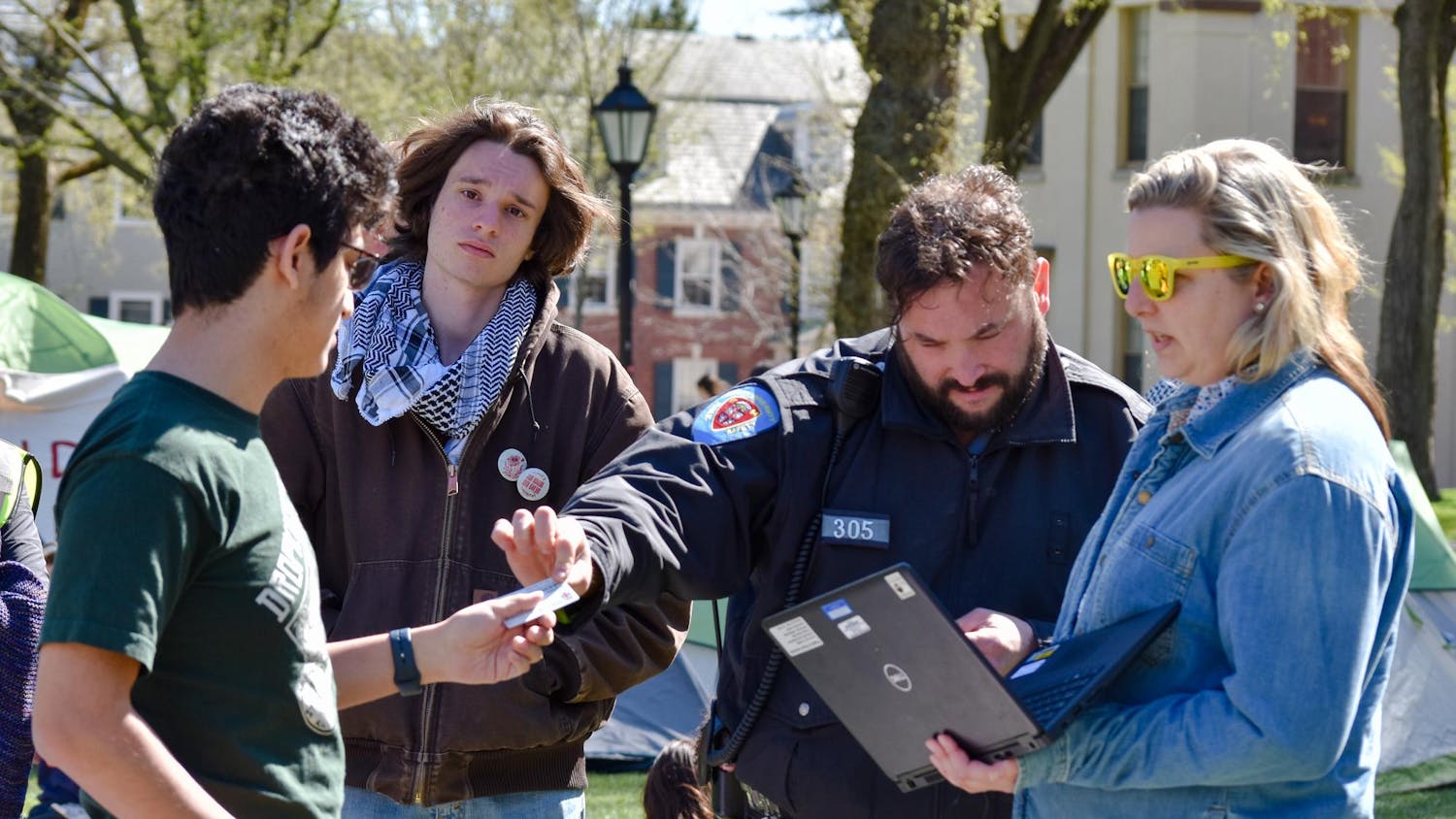Poetry married politics in the third Achebe Colloquium on Africa held on campus this weekend. This year marked the first time the two-day colloquium, which included panel discussions and speeches on political issues across Africa, featured poetry readings and literary discussion.
The walls of the Martinos Auditorium in the Perry and Marty Granoff Center for the Creative Arts echoed with voices both bellowing and fragile during what Nduka Otiono, a postdoctoral fellow in Africana studies who presided over the colloquium, called "two days of marathon presentations."
Speakers from both the academic and political sphere led seven panel discussions on topics including the Arab Spring, foreign intervention in Africa and the prospects for peace in Darfur, South Sudan and Zimbabwe. Professor of Africana Studies Chinua Achebe's homeland of Nigeria was not featured in discussions this year.
Along with the panel discussions, there were three keynote addresses by Ali Suleiman Aujali, Libyan ambassador to the United States, David Shinn, former U.S. ambassador to Ethiopia and Burkina Faso, and John Schram, former Canadian ambassador to Zimbabwe, Angola, Ethiopia, Eritrea and the Sudan. Each day began with an opening address — Achebe opened Sunday's events and Emeka Anyaoku, chief and former secretary general of the Commonwealth, spoke Saturday.
Otiono compared the colloquium's rhythm to a novel. He told The Herald the event maintained a high tempo, plateauing early Sunday, but reaching a crescendo for "Literature: The Spoken Word" — Sunday's final poetry readings and discussion by six African writers, including Achebe.
"Throughout these whole wonderful two days, language and the nuance of language has been imbedded in everything," said Alastair Niven, moderator of the readings. The readings allowed language to be brought into the open and be faced "head-on," he explained.
The writers, hailing mostly from Nigeria and the United States, gave readings in both English and Igbo, with African-American poet Sonia Sanchez sprinkling bits of Wolof into her poetry.
"I wanted to do a piece that would connect Africa to the United States" as the colloquium has done, Sanchez told The Herald of her selections, which dealt with the familial struggles of an African-American family from the South and brought her to tears at points.
Bassey Ikpi, the youngest writer of the group, spoke timidly of her amazement at being included in the event, but her passionate voice filled the room as she recited a poem about losing the Igbo language since moving to the United States as a child. Jayne Cortez injected the readings with political unease though lines such as "They want the oil, but they don't want the people," and "The ruling class will tell you that there is no ruling class."
Though most of his earlier work has been in English, Achebe recited a poem in Igbo written for the wake of Nigerian poet Christopher Okigbo, who was killed in the Biafran War. "I believe in all the languages we speak," he said.
"The person of Chinua Achebe lends an enormous amount of prestige" to the colloquium, John Campbell, former U.S. ambassador to Nigeria and speaker for the Zimbabwe panel, told The Herald. Campbell has attended all three Achebe Colloquiums and said they improve each year as they gain fame.
Between panels and speeches, the speakers and audience — many of whom had traveled to attend the colloquium — mingled outside the auditorium, exchanging business cards, autographs and ideas.
Fred Obeng-Ampofo, a University media services technician from Ghana, told The Herald the chance to speak to such important figures was one of his favorite aspects of the colloquium, describing Anyaoku as "very down-to-earth." But he added he was "a little bit saddened that I didn't see many students here."
The question of the appropriate level of foreign involvement in African affairs was raised often throughout the colloquium's talks. Two back-to-back panels focused entirely on the presence of the United States and China in Africa. "Only Africans can fix African conflicts," Schram said in his keynote address. But he explained this does not free Western nations from responsibility. Foreign states and organizations can provide support in nations like South Sudan, he said, "but it will only work in the long term if the people of South Sudan can design and build the country they want and they deserve."
Aujali — who gained his ambassadorship under recently ousted Libyan leader Muammar Gaddafi, but rejected Gaddafi's rule once the protests began — expressed gratitude to the United States for their intervention against Gaddafi in his address and encouraged American companies to remain involved in Libya's economic growth.
As the ambassador to the U.S. under the current leadership, he said he had a message for the U.S. in particular: "Please, don't target these Muslims as your enemy. Don't send the wrong message." He said Muslims in Libya could use American support as they make the difficult adjustment to a democracy and warned against unfriendly action.
At the end of the "Zimbabwe: Prospects for a Stable Democracy or Dictatorship?" panel, Anyaoku, who was not a panelist, rose during questions to make a long, impassioned speech about the reasons for negative sentiments toward Zimbabwe's President Robert Mugabe and "the centrality of the land issue" in Zimbabwe that tra
ces back to its independence, which he felt had so far been neglected in discussion.
Following the speech, Achebe, who had thus far played a mostly passive role in the discussions, took the floor to praise Anyaoku's contribution. "Let's understand this core problem that has been raised by one of the guests," he said, reminding the audience of Anyaoku's presence during Zimbabwe's independence negotiations.

ADVERTISEMENT




